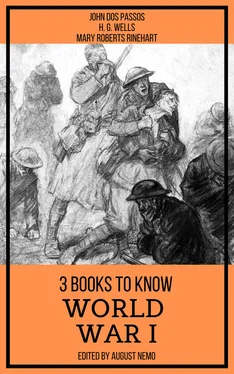“What did you get to go to the hospital?” said Meadville.
“Only pneumonia,” said Daniels, “but I had a buddy who was split right in half by a piece of a shell. He was standin' as near me as you are an' was whistlin' 'Tipperary' under his breath when all at once there was a big spurt o' blood an' there he was with his chest split in half an' his head hangin' a thread like.”
Meadville moved his quid of tobacco from one cheek to the other and spat on to the sawdust of the floor. The men within earshot stopped working and looked admiringly at Daniels.
“Well; what d'ye reckon's goin' on at the front now?” said Meadville.
“Damned of I know. The goddam hospital at Orleans was so full up there was guys in stretchers waiting all day on the pavement outside. I know that.... Fellers there said hell'd broke loose for fair. Looks to me like the Fritzies was advancin'.”
Meadville looked at him incredulously.
“Those skunks?” said Fuselli. “Why they can't advance. They're starvin' to death.”
“The hell they are,” said Daniels. “I guess you believe everything you see in the papers.”
Eyes looked at Daniels indignantly. They all went on working in silence.
Suddenly the lieutenant, looking strangely flustered, strode into the warehouse, leaving the tin door open behind him.
“Can anyone tell me where Sergeant Osler is?”
“He was here a few minutes ago,” spoke up Fuselli.
“Well, where is he now?” snapped the lieutenant angrily.
“I don't know, sir,” mumbled Fuselli, flushing.
“Go and see if you can find him.”
Fuselli went off to the other end of the warehouse. Outside the door he stopped and bit off a cigarette in a leisurely fashion. His blood boiled sullenly. How the hell should he know where the top sergeant was? They didn't expect him to be a mind-reader, did they? And all the flood of bitterness that had been collecting in his spirit seethed to the surface. They had not treated him right, He felt full of hopeless anger against this vast treadmill to which he was bound. The endless succession of the days, all alike, all subject to orders, to the interminable monotony of drills and line-ups, passed before his mind. He felt he couldn't go on, yet he knew that he must and would go on, that there was no stopping, that his feet would go on beating in time to the steps of the treadmill.
He caught sight of the sergeant coming towards the warehouse, across the new green grass, scarred by the marks of truck wheels.
“Sarge,” he called. Then he went up to him mysteriously. “The loot wants to see you at once in Warehouse B.”
He slouched back to his work, arriving just in time to hear the lieutenant say in a severe voice to the sergeant:
“Sergeant, do you know how to draw up court-martial papers?”
“Yes, sir,” said the sergeant, a look of surprise on his face. He followed the precise steps of the lieutenant out of the door.
Fuselli had a moment of panic terror, during which he went on working methodically, although his hands trembled. He was searching his memory for some infringement of a regulation that might be charged against him. The terror passed as fast as it had come. Of course he had no reason to fear. He laughed softly to himself. What a fool he'd been to get scared like that, and a summary court-martial couldn't do much to you anyway. He went on working as fast and as carefully as he could, through the long monotonous afternoon.
That night nearly the whole company gathered in a group at the end of the barracks. Both sergeants were away. The corporal said he knew nothing, and got sulkily into bed, where he lay, rolled in his blankets, shaken by fit after fit of coughing.
At last someone said:
“I bet that kike Eisenstein's turned out to be a spy.”
“I bet he has too.”
“He's foreign born, ain't he? Born in Poland or some goddam place.”
“He always did talk queer.”
“I always thought,” said Fuselli, “he'd get into trouble talking the way he did.”
“How'd he talk?” asked Daniels.
“Oh, he said that war was wrong and all that goddamed pro-German stuff.”
“D'ye know what they did out at the front?” said Daniels. “In the second division they made two fellers dig their own graves and then shot 'em for sayin' the war was wrong.”
“Hell, they did?”
“You're goddam right, they did. I tell you, fellers, it don't do to monkey with the buzz-saw in this army.”
“For God's sake shut up. Taps has blown. Meadville, turn the lights out!” said the corporal angrily. The barracks was dark, full of a sound of men undressing in their bunks, and of whispered talk.
The company was lined up for morning mess. The sun that had just risen was shining in rosily through the soft clouds of the sky. The sparrows kept up a great clattering in the avenue of plane trees. Their riotous chirping could be heard above the sound of motors starting that came from a shed opposite the mess shack.
The sergeant appeared suddenly; walking past with his shoulders stiff, so that everyone knew at once that something important was going on.
“Attention, men, a minute,” he said.
Mess kits clattered as the men turned round.
“After mess I want you to go immediately to barracks and roll your packs. After that every man must stand by his pack until orders come.” The company cheered and mess kits clattered together like cymbals.
“As you were,” shouted the top sergeant jovially.
Gluey oatmeal and greasy bacon were hurriedly bolted down, and every man in the company, his heart pounding, ran to the barracks to do up his pack, feeling proud under the envious eyes of the company at the other end of the shack that had received no orders.
When the packs were done up, they sat on the empty hunks and drummed their feet against the wooden partitions waiting.
“I don't suppose we'll leave here till hell freezes over,” said Meadville, who was doing up the last strap on his pack.
“It's always like this.... You break your neck to obey orders an'...”
“Outside!” shouted the sergeant, poking his head in the door.
“Fall in! Atten-shun!”
The lieutenant in his trench coat and in a new pair of roll puttees stood facing the company, looking solemn.
“Men,” he said, biting off his words as a man bites through a piece of hard stick candy; “one of your number is up for courtmartial for possibly disloyal statements found in a letter addressed to friends at home. I have been extremely grieved to find anything of this sort in any company of mine; I don't believe there is another man in the company... low enough to hold... entertain such ideas....”
Every man in the company stuck out his chest, vowing inwardly to entertain no ideas at all rather than run the risk of calling forth such disapproval from the lieutenant. The lieutenant paused:
“All I can say is if there is any such man in the company, he had better keep his mouth shut and be pretty damn careful what he writes home.... Dismissed!”
He shouted the order grimly, as if it were the order for the execution of the offender.
“That goddam skunk Eisenstein,” said someone.
The lieutenant heard it as he walked away. “Oh, sergeant,” he said familiarly; “I think the others have got the right stuff in them.”
The company went into the barracks and waited.
The sergeant-major's office was full of a clicking of typewriters, and was overheated by a black stove that stood in the middle of the floor, letting out occasional little puffs of smoke from a crack in the stove pipe. The sergeant-major was a small man with a fresh boyish face and a drawling voice who lolled behind a large typewriter reading a magazine that lay on his lap.
Fuselli slipped in behind the typewriter and stood with his cap in his hand beside the sergeant-major's chair.
Читать дальше












